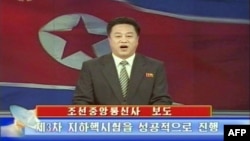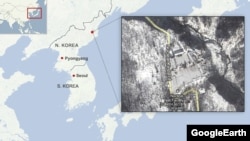After three weeks of belligerent warnings, North Korea conducted its third test Tuesday in a nuclear weapons program that dates back to the 1960s.
If preliminary estimates from seismic monitors in South Korea and elsewhere prove correct, this was by far Pyongyang's most powerful explosion of a nuclear device.
U.S. President Barack Obama called the test a "highly provocative act." His swift condemnation was echoed by governments around the world, including South Korea, Japan, China and Russia.
According to former U.S. State Department official Mitchell Reiss, the underground blast is further confirmation that North Korea is heading "very methodically and deliberately" toward enhanced ballistic-missile and nuclear-weapons capability. He said the dual track is extremely worrisome.
"It is alarming enough they are doing each of those separately, but it is the combination of the two that poses significant risks to the United States and our friends and allies in the region," Reiss said.
Later Tuesday, North Korea's Foreign Ministry warned of unspecified "second and third measures of greater intensity" if Washington maintains its hostility.
Related video report by Luis Ramirez
U.S. Territory Under Threat
Analyst Bruce Klingner, who studied North Korea for years with the Central Intelligence Agency, said the continental United States is increasingly under threat by the North's progress, including a successful long-range missile test in December.
"South Korean officials, after they resurrected the missile debris from the bottom of the ocean, estimated the rocket could have gone 6,000 [9,500 kilometers] or even 10,000 miles [16,000 kilometers], which would threaten not only Hawaii and Alaska, but even parts of the continental U.S.," Klingner said.
The official North Korean news service claimed Tuesday's test used a "miniaturized and lighter nuclear device with greater explosive capability than before."
The South Korean Defense Ministry said the blast generated an explosive yield of between six and seven kilotons. That is stronger than the North’s two previous nuclear tests in 2006 and 2009, but far short of the most powerful U.S. weapons in use today, with a force of about 1,000 kilotons.
Klingner said observers have often been dismissive of North Korea's progress because its long-range missile tests had failed until the December launch. But that test showed the North was able to place a satellite into orbit - which scientists say is the same capability required to put a warhead "anywhere on the face of the Earth."
Chinese Leverage
Reiss, who is now president of Washington College in Maryland, said the blast presents a serious dilemma for the Obama administration and a new group of leaders in China, South Korea and Japan.
"The bottom line is that the North Koreans have made a strategic decision to be a full-fledged nuclear weapons state. The challenge right now is what the United States, our friends and allies in the region and, especially, the Chinese, are going to do about it," Reiss said.
In New York Tuesday, the United Nations Security Council condemned the North Korean nuclear test, calling it a "grave violation" of previous Security Council resolutions against the North's weapons programs. Council members will begin working on what they called "appropriate measures" to punish Pyongyang for flouting its authority.
But it is China - North Korea's last remaining major ally - that arguably has enough leverage, through its oil deliveries and other assistance, to force Pyongyang to change its behavior.
The Chinese government issued a statement several hours after the blast expressing its "firm opposition" to the test. But Tuesday's powerful detonation leaves some skeptical about how Beijing will react, given its increased economic ties to the North.
"It clearly shows how little influence Beijing has, or how little it's willing to use," said Klingner. "Indeed, their increased economic engagement with North Korea undermines any incentive for [it] to return to the six-party talks," he said.
After the detonation, Pyongyang said the test demonstrated its nuclear deterrence has become "diversified," raising questions about whether North Korea used enriched uranium rather than reprocessed plutonium like in previous blasts.
That worries the United States, South Korea and Japan because while the North has only enough plutonium for six to eight bombs, it can produce enriched uranium well into the future.
Message to Iran
Analyst Reiss said Washington should push Seoul to share intelligence with the Japanese because that would help ensure a coordinated response to the threat. He also warned Tehran is watching the world's reaction extremely closely.
"If the United States undertakes no sanctions, does not punish North Korea in any way, it will effectively be giving Iran a green light, or at least a suggestion, that it can go down this path as well and not really suffer any consequences," Reiss said.
If preliminary estimates from seismic monitors in South Korea and elsewhere prove correct, this was by far Pyongyang's most powerful explosion of a nuclear device.
U.S. President Barack Obama called the test a "highly provocative act." His swift condemnation was echoed by governments around the world, including South Korea, Japan, China and Russia.
According to former U.S. State Department official Mitchell Reiss, the underground blast is further confirmation that North Korea is heading "very methodically and deliberately" toward enhanced ballistic-missile and nuclear-weapons capability. He said the dual track is extremely worrisome.
"It is alarming enough they are doing each of those separately, but it is the combination of the two that poses significant risks to the United States and our friends and allies in the region," Reiss said.
Later Tuesday, North Korea's Foreign Ministry warned of unspecified "second and third measures of greater intensity" if Washington maintains its hostility.
Related video report by Luis Ramirez
U.S. Territory Under Threat
Analyst Bruce Klingner, who studied North Korea for years with the Central Intelligence Agency, said the continental United States is increasingly under threat by the North's progress, including a successful long-range missile test in December.
"South Korean officials, after they resurrected the missile debris from the bottom of the ocean, estimated the rocket could have gone 6,000 [9,500 kilometers] or even 10,000 miles [16,000 kilometers], which would threaten not only Hawaii and Alaska, but even parts of the continental U.S.," Klingner said.
The official North Korean news service claimed Tuesday's test used a "miniaturized and lighter nuclear device with greater explosive capability than before."
The South Korean Defense Ministry said the blast generated an explosive yield of between six and seven kilotons. That is stronger than the North’s two previous nuclear tests in 2006 and 2009, but far short of the most powerful U.S. weapons in use today, with a force of about 1,000 kilotons.
Klingner said observers have often been dismissive of North Korea's progress because its long-range missile tests had failed until the December launch. But that test showed the North was able to place a satellite into orbit - which scientists say is the same capability required to put a warhead "anywhere on the face of the Earth."
Chinese Leverage
Reiss, who is now president of Washington College in Maryland, said the blast presents a serious dilemma for the Obama administration and a new group of leaders in China, South Korea and Japan.
"The bottom line is that the North Koreans have made a strategic decision to be a full-fledged nuclear weapons state. The challenge right now is what the United States, our friends and allies in the region and, especially, the Chinese, are going to do about it," Reiss said.
In New York Tuesday, the United Nations Security Council condemned the North Korean nuclear test, calling it a "grave violation" of previous Security Council resolutions against the North's weapons programs. Council members will begin working on what they called "appropriate measures" to punish Pyongyang for flouting its authority.
But it is China - North Korea's last remaining major ally - that arguably has enough leverage, through its oil deliveries and other assistance, to force Pyongyang to change its behavior.
The Chinese government issued a statement several hours after the blast expressing its "firm opposition" to the test. But Tuesday's powerful detonation leaves some skeptical about how Beijing will react, given its increased economic ties to the North.
"It clearly shows how little influence Beijing has, or how little it's willing to use," said Klingner. "Indeed, their increased economic engagement with North Korea undermines any incentive for [it] to return to the six-party talks," he said.
After the detonation, Pyongyang said the test demonstrated its nuclear deterrence has become "diversified," raising questions about whether North Korea used enriched uranium rather than reprocessed plutonium like in previous blasts.
That worries the United States, South Korea and Japan because while the North has only enough plutonium for six to eight bombs, it can produce enriched uranium well into the future.
Message to Iran
Analyst Reiss said Washington should push Seoul to share intelligence with the Japanese because that would help ensure a coordinated response to the threat. He also warned Tehran is watching the world's reaction extremely closely.
"If the United States undertakes no sanctions, does not punish North Korea in any way, it will effectively be giving Iran a green light, or at least a suggestion, that it can go down this path as well and not really suffer any consequences," Reiss said.














